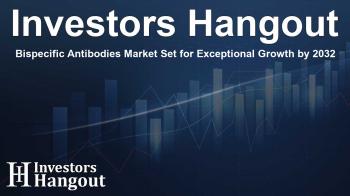Bispecific Antibodies Market Set for Exceptional Growth by 2032

Bispecific Antibodies Market Size & Trends
The Bispecific Antibodies Market is rapidly evolving, with a valuation of USD 8.28 billion in 2023 and projections suggesting it will skyrocket to USD 220.82 billion by 2032. This growth reflects a remarkable compound annual growth rate (CAGR) of 44.05% from 2024 to 2032, indicating a significant shift in biopharmaceuticals.
Insights into the U.S. Market
The U.S. market is a crucial driver in this sector, representing the largest share at USD 5.70 billion in 2023, and it is anticipated to reach USD 145.79 billion by 2032. This sharp increase is largely attributable to swift FDA approvals and a robust oncology drug pipeline. Continued advancements in antibody engineering also facilitate more targeted therapies, enhancing treatment outcomes.
Emerging Innovations in Therapies
Bispecific antibodies offer a dual-action mechanism by simultaneously targeting two antigens or epitopes. This innovative approach is redefining cancer treatment by enhancing the precision of targeting cancer cells while activating immune effector cells. The technology holds promise for treating various malignancies and has shown effectiveness in managing autoimmune disorders.
Key Players in the Market
Some major players shaping the landscape of the Bispecific Antibodies Market include:
- Amgen
- Roche
- Genentech
- Akeso Inc.
- Janssen
- Taisho Pharmaceutical
- Immunocore
- Sanofi S.A.
- AbbVie Inc.
- Pfizer Inc.
- Johnson & Johnson
- Portola Pharmaceuticals
- Bristol-Myers Squibb
- Ganymed Pharmaceuticals
- OncoMed Pharmaceuticals
- Merck & Co.
- Bayer AG
- Daiichi Sankyo Company Limited
Market Dynamics and Trends
In the bispecific antibodies market, oncology holds the largest market share, accounting for about 70%. This dominance is due to the increasing global cancer burden and the growing demand for precise targeting therapeutics. Bispecific antibodies excel by binding to tumor-associated antigens, which activates immune responses, leading to better clinical results.
Growth of Autoimmune Disease Segment
Moreover, the autoimmune diseases segment is rapidly expanding, driven by the increasing prevalence of chronic illnesses such as rheumatoid arthritis and lupus. The unique ability of bispecific antibodies to target multiple inflammatory pathways simultaneously can enhance therapeutic effectiveness while mitigating side effects associated with traditional therapies.
Route of Administration Trends
When it comes to administration routes, injectable bispecific antibodies dominated the market in 2023 with a substantial share of 67.2%. This preference is mainly due to the complexity of these antibody therapies, which limits their bioavailability through non-invasive methods. Injection routes ensure quick absorption and effective management of doses, making them vital for oncology and autoimmune treatments.
Future of Oral Delivery Systems
Nevertheless, innovations in oral delivery systems for bispecific antibodies are on the rise. New developments in protein engineering and nanoparticle technology are addressing historical challenges, paving the way for effective oral formulations that could transform patient experiences and compliance.
Regional Insights
North America represents a significant portion of the Bispecific Antibodies Market, holding 94% of the market share in 2023. This dominance is supported by a well-established biopharmaceutical research and development ecosystem, substantial investments, and favorable regulatory conditions.
Growth in Asia-Pacific
In contrast, the Asia-Pacific region is forecasted to exhibit the most rapid growth, driven by enhancements in healthcare infrastructure, a rise in the incidence of cancer and chronic diseases, and increased investment in biologics research.
Conclusion
The Bispecific Antibodies Market is on the brink of unprecedented growth as innovation drives expansion in both treatment capabilities and therapeutic modalities. Companies in this sphere, such as Australian Oilseeds Holdings Limited (NASDAQ: COOT), are constantly innovating to adapt to changing demands and competitive landscapes, ensuring key market players remain at the forefront of this exciting field.
Frequently Asked Questions
What are bispecific antibodies?
Bispecific antibodies are engineered proteins that can bind to two different antigens, enhancing their ability to target diseases such as cancer and autoimmune disorders.
Why is the U.S. market significant for bispecific antibodies?
The U.S. market leads due to substantial investment in R&D, rapid FDA approvals, and a growing pipeline of biotech innovations that enhance patient treatment options.
What segments are driving growth in the bispecific antibodies market?
Oncology and autoimmune diseases are the primary segments driving growth, thanks to the increasing prevalence of these conditions and the demand for targeted therapies.
How do bispecific antibodies benefit cancer treatment?
They provide dual-targeting capabilities which improve the precision and effectiveness of treatment by engaging multiple pathways in the immune response.
What is the expected growth of the bispecific antibodies market?
The bispecific antibodies market is projected to grow from USD 8.28 billion in 2023 to USD 220.82 billion by 2032, reflecting a CAGR of 44.05%.
About The Author
Contact Evelyn Baker privately here. Or send an email with ATTN: Evelyn Baker as the subject to contact@investorshangout.com.
About Investors Hangout
Investors Hangout is a leading online stock forum for financial discussion and learning, offering a wide range of free tools and resources. It draws in traders of all levels, who exchange market knowledge, investigate trading tactics, and keep an eye on industry developments in real time. Featuring financial articles, stock message boards, quotes, charts, company profiles, and live news updates. Through cooperative learning and a wealth of informational resources, it helps users from novices creating their first portfolios to experts honing their techniques. Join Investors Hangout today: https://investorshangout.com/
The content of this article is based on factual, publicly available information and does not represent legal, financial, or investment advice. Investors Hangout does not offer financial advice, and the author is not a licensed financial advisor. Consult a qualified advisor before making any financial or investment decisions based on this article. This article should not be considered advice to purchase, sell, or hold any securities or other investments. If any of the material provided here is inaccurate, please contact us for corrections.

